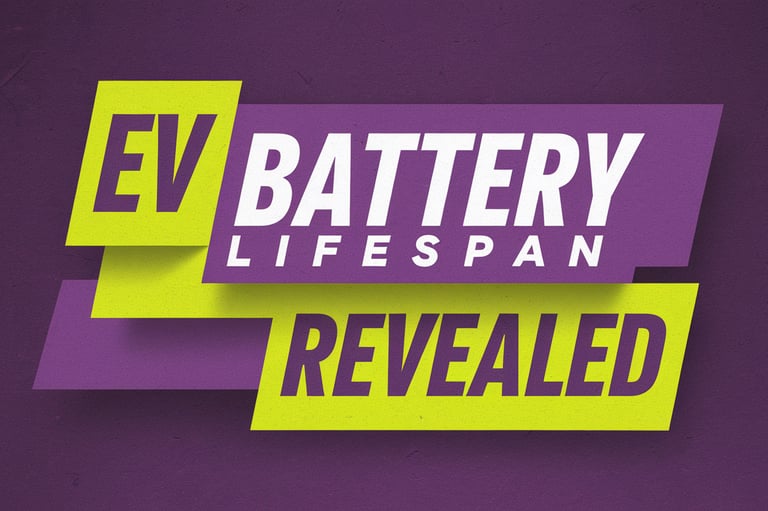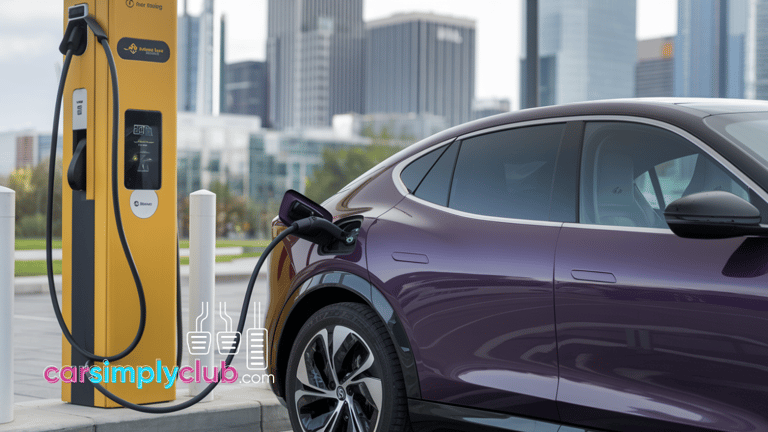EV Battery Life Revealed:
The Truth About Battery Degradation
Are you curious about how long your Electric Vehicle (EV) battery will last?
Understanding the lifespan of your EV battery is crucial.
This comprehensive guide answers key questions about how long EV batteries last, replacement costs, and what to consider when buying a used EV.


Factors Affecting EV Battery Life
Driving Habits: Aggressive driving can reduce your battery's range. To maximize battery life, adopt a smoother driving style.
Climate: Extreme temperatures can impact battery performance. Thermal management systems help regulate battery temperature, and parking in shaded or temperature-controlled areas can also help.
Inactivity: Long-term storage can affect battery health. It's best to keep your battery at an ideal charge level if your EV will be parked for extended periods.
EV Battery Lifespan and Replacement
Average Lifespan: EV batteries typically last between 10-15 years, meaning most owners won't need a replacement during their ownership.
Signs of Battery Issues: Warning lights and reduced driving range can indicate battery problems.
Replacement Considerations: Factors like battery health and warranty influence the need for replacement. Getting a battery health report and replacement estimates is essential. Replacement costs range from $5,000 to $15,000, and it's important to use qualified professionals for battery service.


EV Battery Degradation Explained Simply
EV battery degradation is when the battery in an electric vehicle loses its ability to hold a charge over time. This happens naturally as the battery is used and ages. Think of it like how your phone battery doesn't last as long after a few years. For EVs, this means the car might not go as far on a single charge as it did when it was new.

Advantages of Electric Vehicles
Better Value Retention: Electric vehicles (EVs) tend to hold their value better than gasoline cars. This means you could get more money back when it's time to sell or trade in your EV.
Savings on Fuel and Maintenance: EVs can save you a lot on fuel costs since electricity is generally cheaper than gasoline. Plus, they have fewer moving parts, which means lower maintenance costs over time.
Considerations When Buying a Used EV
Battery Health Check: It's crucial to have a qualified mechanic check the battery health before purchasing a used EV. This ensures you're not buying a vehicle with a battery that's on its last legs.
Charging Access: Make sure you have convenient access to charging stations at home and along your regular routes. This will make owning an EV much more practical and stress-free.
Decision-Making for Used EVs
When considering a used EV with a battery at reduced capacity, think about the remaining lifespan of the battery and your personal needs. If the battery still has a few good years left and meets your driving requirements, it could still be a great deal.


EV Charging Options
Charger Types:
Level 1: This is the slowest charging option, typically used at home with a standard outlet. It's ideal for overnight charging.
Level 2: Faster than Level 1, these chargers are often found at public charging stations and can also be installed at home.
They are great for daily use.
Level 3 (DC Fast Charging): The fastest option, perfect for long trips.
However, frequent use can degrade the battery faster, so it's best to use it sparingly.
Connectors:
J Plug: Common in North America, compatible with most EVs.
CCS Adapter for Tesla: Allows Tesla owners to use non-Tesla fast chargers.
Always check the compatibility of your EV with the charger before using Level 3 fast charging to avoid any issues.
For more information on EV battery health, check out this resource from Natural Resources Canada:
Wrapping Up: Keeping Your EV Battery Happy
So, you've cruised through the world of EV batteries – their lifespan, how to keep them healthy, and even the plug situation (we see you, Tesla!). Here's a quick refresher:
Maximizing EV Battery Life: To get the most out of your EV battery, adopt smooth driving habits, manage extreme temperatures, avoid constant fast charging, and maintain optimal charge levels during long-term storage. Regularly check your battery health and use qualified professionals for any necessary maintenance or replacements.
Listen to your car: Warning lights or a sudden drop in range might signal a battery issue. Don't ignore them!
Used EVs can be a steal: Just get a pro to check the battery health before you buy.
Chargers and connectors: They're like puzzle pieces – gotta make sure they fit! Level 1 for home charging, Level 2 for on-the-go top-ups, and Level 3 for emergencies (go easy on these, though).
Join The Club!
Stay informed with Car News and Car Tech updates, and exclusive emails right in your inbox.
